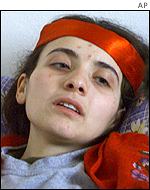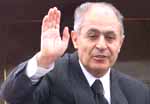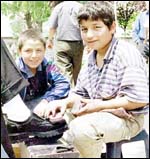24
May 2002
![]()
2. "Turkish president plans meeting of politicians on EU bid", Turkish President Ahmet Necdet Sezer said on Thursday he was planning to meet the government and leaders of the political parties in parliament to discuss Turkey's efforts to join the European Union.
3. "U.N. rapporteur for displaced people to visit the villages in the southeast", special United Nations (U.N.) rapporteur Francis Deng, who is the undersecretary general of the U.N., will visit Ankara on Monday and will travel to the villages in Sirnak and Diyarbakir provinces of the southeast.
4. "Saddam 'cleansing' of Kurds continues", on the day that President Bush called for action against Iraq, Amberin Zaman reports from Northern Iraq on Saddam's repression of the Kurds.
5. "Court rejects case calling Kurdish families to change their children's names", a Turkish court has rejected charges brought against seven families who gave their children traditional Kurdish names, reports said Wednesday.
6. "Kurdish Kids Get Justice from European Court, Says Rights Group", London-based rights campaigners Tuesday welcomed a European court judgment requiring Turkey to pay compensation to a family of Kurdish orphans whose parents and a sibling were killed in front of them by armed men.
1. - AFP - "Death toll rises to 51 in Turkish prison hunger strike":
ISTANBUL / 23 May 2002
The death toll in a long-standing hunger strike by Turkish prisoners
against controversial jail reforms reached 51 when a detainee died in
a hospital here on Thursday, a human rights activist said.
Okan Kulekci, 19, had been fasting for 240 days when he died, a spokesman for the Turkish Human Rights Association (IHD) told AFP. Kulekci was on trial for membership of a far-left organization, the Turkish Revolutionary Communists Union (TIKB), since he was detained during a demonstration two years ago, the spokesman said. The deadly hunger strike was launched in October 2000 by mainly left-wing inmates to protest the introduction of high-security jails, in which cells for one to three people replaced large dormitories for dozens of inmates.
Backed by rights groups, protesters say the new arrangement leaves them socially isolated and more vulnerable to torture and maltreatment. The government, however, has categorically ruled out a return to the dormitory system, arguing that it was the main reason behind frequent riots and hostage-taking incidents in the country's unruly jails. The death toll from the strike includes both prisoners and outside supporters of the movement.
But on Wednesday, IHD chairman Husnu Ondul told AFP that outside supporters of the strike had ended their action while 55 prisoners were still pursuing the strike. Apart from those who have starved themselves to death, four prisoners
burned themselves to death in support of the strike and
another four people died last November in a police raid on an Istanbul
house occupied by hunger strikers. ![]()
2. - AFP - "Turkish president plans meeting of politicians on EU bid":
ANKARA / 23 May 2002
Turkish President Ahmet Necdet Sezer said on Thursday he was planning
to meet the government and leaders of the political parties in parliament
to discuss Turkey's efforts to join the European Union.
"I am considering meeting both the coalition leaders and the leaders of parties represented in parliament in the coming days on the European Union issue," Sezer told reporters just before he left the Turkish capital for an official visit to Albania, Anatolia news agency reported. Turkey has been a candidate for EU membership since 1999 and is the only one among the 13 hopefuls not to have begun accession talks with the 15-member bloc. On Tuesday, the leaders of the three-party ruling coaliton held a meeting at a hospital in Ankara, where Prime Minister Bulent Ecevit has been under treatment since Friday, to discuss a series of reforms essential to its efforts to bring itself up to European norms.
A statement issued after the meeting said the leaders
had received from the foreign ministry its views on Turkish-EU relations
and added that they would discuss the issue at their next meeting. Key
EU requirements such as the abolition of capital punishment and the
lifting of a ban on Kurdish language broadcasts and education have led
to arguments within the coalition, with the nationalist wing strongly
opposed to such changes. Turkey has said on several occasions that it
wants a date for the opening of accession negotiations set by the end
of 2002 but it has been clearly told by its European partners that talks
can start only if Ankara fulfills the EU's political criteria. ![]()
3. - Turkish Daily News - "U.N. rapporteur for displaced people to visit the villages in the southeast":
ANKARA / 24 May 2002 / by SAADET ORUC
Special United Nations (U.N.) rapporteur Francis Deng, who is the
undersecretary general of the U.N., will visit Ankara on Monday and
will travel to the villages in Sirnak and Diyarbakir provinces of the
southeast.
The mission of the Sudanese official Deng will be related with the "displaced people in the Southeast," diplomatic sources told the Turkish Daily News (TDN).
Deng will receive the officials from the Human Rights Association (IHD) and will be visiting the Turkish Grand National Assembly (TBMM)'s commission on human rights on Monday.
Acting chairman of the commission Emre Kocaoglu will receive the undersecretary general of the U.N..
Deng, who is the former Vice President of Sudan, will be taken to the "model" villages, which gathered the villagers returned back to their hometowns after being forced to leave their villages.
The U.N. official will be received by Interior Minister Rustu Kazim Yucelen and State Minister Nejat Arseven, who is responsible for human rights as well as top foreign ministry officials.
Especially Mersin, Diyarbakir and Istanbul are the main cities that became the places, which were chosen by the internal immigrants.
Thousands of villages were burnt and the villagers were forced to leave their hometowns.
According to the information given by the Human Rights
Association (IHD), 3688 villages were evacuated in the southeast. ![]()
4. - The Telegraph - "Saddam 'cleansing' of Kurds continues":
24 May 2002
On the day that President Bush called for action against Iraq, Amberin
Zaman reports from Northern Iraq on Saddam's repression of the Kurds.
'Not Bush, not Blair, only the Almighty Allah can punish Saddam in the way he deserves," said the Kurdish ambulance driver, shielding his only good eye from the Iraqi sun. "I hope it will be very slow and very painful."
Ferhad Mohammed Karim, 50, lost his left eye after enduring seven months of non-stop torture by Saddam's security forces in an Iraqi jail.
Mr Karim was thrown out of Iraq's main oil-producing northern province, Kirkuk, in February after refusing to sign papers identifying himself as an Arab.
"They beat me, they starved me, they threatened to kill my children and finally blinded me, but I refused," said Mr Karim. "I was born a Kurd and will die a Kurd."
Like hundreds of other Iraqi Kurdish refugees sheltering in the Bardakahraman camp on the outskirts of the Kurdish-controlled city of Sulaymaniyah, Mr Karim is among the most recent victims of Saddam's decades-long "Arabisation" campaign.
The Iraqi leader's aim is to ethnically cleanse all non-Arabs from Kirkuk, where the majority of Iraq's vast oil reserves are extracted, and in so doing crush any putative attempt by Kurds and a Turkic-speaking minority known as the Turcomens to claim the region for their own.
That is what the Iraqi Kurds tried to do during their failed rebellion against the dictator at the end of the Gulf war. Thousands of Kurds perished after the American-led coalition failed to protect them from advancing Iraqi troops and helicopter gunships, having encouraged them to rise up against Saddam.
An international outcry that followed television pictures of millions of Kurdish refugees huddled in the snow-capped mountains along the borders of Turkey and Iran prompted the allies to set up the Kurdish "safe haven" north of the 36th parallel protected by American and British fighter planes.
Iraqi Kurdish leaders insist that Kirkuk needs to be incorporated into the Kurdish federal administration which they demand should be established in exchange for their support for an American-led "regime-changing operation" in Baghdad.
Massoud Barzani and Jalal Talabani, leaders of the rival Kurdish factions governing Iraqi Kurdistan, are said to have raised the Kirkuk issue during secret talks in Germany this month with US officials.
Their demands have deepened Turkish suspicions that the Iraqi Kurds, for all their denials, are seeking to establish an independent state, viable only if they control Kirkuk. Turkey has threatened to intervene militarily should the Iraqi Kurds seek to break away from Baghdad, fearing that the emergence of an independent Kurdish state on its borders would re-ignite nationalism among its own estimated 12 million Kurds.
"Kirkuk is a highly explosive issue, we have to keep the Turks as comfortable as possible. Their intervention would produce chaos," said Barham Saleh, a senior official from the Patriotic Union of Kurdistan, which controls the eastern part of the Kurdish enclave.
"We cannot say it is a Kurdish city. Arabs, Turcomens and Assyrians have lived there for centuries too."
Western diplomats estimate that 150 families are driven out of Kirkuk every month. Thousands are thought to be making their way illegally in rickety boats to Europe after crossing into neighbouring Syria, Turkey and Iran.
Mr Saleh said that since 1991 some 70,000 refugees have poured into the eastern part of the enclave controlled by his party. "They are putting huge pressure on our economy, we can barely cope."
Saddam's assassination tactics have in the past also included financial rewards to Arabs who take Kurdish wives as well as Arabising Kurdish and Turcomen names.
Back in the Bardakahraman camp, Cemile Ahmad gestured towards a mud hut where she and her nine children have lived since 1997.
She said: "Life is that of a dog. We have no sewage, no running water, and scorpions and snakes have become our worst enemies after Saddam."
She and fellow refugees rely on meagre rations of flour, rice and sugar provided by the local government. With no fuel to burn in the winter and appalling sanitary conditions exacerbated by the summer heat, many children succumb to starvation and disease.
Munira Farid, a 27-year-old mother of four, was expelled from Kirkuk this month after her husband, a farmer, refused to join Saddam's Al-Quds, or Jerusalem, regiment that is meant to "liberate" Palestine.
Its soldiers allegedly include male relatives of Palestinian suicide bombers, who are being resettled in Kirkuk, together with thousands of Iraqi Arabs.
"The Iraqis seized all our property, we have nothing
left," said Mrs Farid. Still, like many here, she said she has
no regrets about leaving her home. "We may live in misery, but
here, at least, we are free to call ourselves Kurds." ![]()
5. - AP - "Court rejects case calling Kurdish families to change their children's names":
23 May 2002
A Turkish court has rejected charges brought against seven families who gave their children traditional Kurdish names, reports said Wednesday.
Prosecutors in the town of Dicle in the largely Kurdish southeast had brought a case against the families in March for giving 23 children names such as Serhat, Baran, Rodja and Zelal. They were charged with breaking a law barring parents from giving their children names that "do not fit our national culture, ethical laws, norms and traditions."
But judge Sirvan Erteken threw the case out Tuesday, saying that some of these Kurdish names were common names in Turkey, the daily Radikal reported Wednesday. Erteken told the families they did not have to rename their children.
Prosecutors argued that the rebel Kurdistan Workers Party, or PKK, used these names as code names for its members, and demanded that the families rename their children.
Firat Anli, a lawyer for the families, said that the names did not harm Turkey's national customs and traditions.
"We even have a film called 'Berivan,"' said Anli. 'Berivan' - the title of a popular television series - was one of the banned names listed in the indictment.
The government has drawn up a list of banned Kurdish names, and has ordered local officials to curb the use of Kurdish place names. Kurds often complain that Turkish authorities in the southeast change Kurdish names for Turkish ones when issuing birth certificates for Kurdish babies.
Turkey fought a 15-year war against the autonomy-seeking PKK. The fighting has slowed since the terrorists declared a unilateral cease-fire in 1999, but sporadic clashes continue. The conflict has left 37,000 dead since 1984.
Turkey, which is seeking membership in the European Union, is under increasing pressure from the group to grant cultural rights to Kurds. The government is apparently considering relaxing bans on broadcasting and education in Kurdish, in an effort to advance its membership bid.
Turkey has argued that granting special rights to its
estimated 12 million Kurds could arouse ethnic tension and even lead
to the division of the country. ![]()
6. - One World - "Kurdish Kids Get Justice from European Court, Says Rights Group":
21 May 2002
London-based rights campaigners Tuesday welcomed a European court
judgment requiring Turkey to pay compensation to a family of Kurdish
orphans whose parents and a sibling were killed in front of them by
armed men.
The Kurdish Human Rights Project (KHRP) said that last week's ruling by the European Court of Human Rights that the Turkish government should pay US$160,000 in damages to the 10 surviving members of the Onen family was a "major victory."
"It is a victory not just for the children, but for the entire Kurdish community," said Sally Eberhardt, a spokeswoman for KHRP, which has been strongly critical of Turkey's treatment of its Kurdish community, which makes up 12 percent of the population.
The European Court ruled last Tuesday that two articles of a regional human rights treaty had been violated when armed men, who were initially identified as Turkish soldiers, raided the Onen's family home, in southeastern Turkey, and killed Ibrahim and Mome Onen and their son, Orhan Onen.
The victims of the 1993 attack were deprived of the right to life and the right to an effective remedy, guaranteed under Articles 2 and 13 of the European Convention on Human Rights, the Strasbourg-based court found.
While the Turkish government denied responsibility for the attack, saying that members of the rebel Kurdistan Workers' Party (PKK) were behind the killings, the court rejected that claim. However, it ruled that there was insufficient evidence to prove the assailants were government soldiers.
Judicial authorities held a series of fact-finding hearings in Turkey's capital Ankara during 1998, five years after the case was first filed in September, 1993. They concluded that the government's version of the attack was "unsubstantiated and contradicted by substantial evidence."
The court also uncovered a number of "grave deficiencies" with the police investigation into the case--which was conducted without photographs of the crime scene or recordings of eye-witness statements--and ruled that it was "undisputed" that the deaths were the result of a premeditated plan to kill Orhan Onen. The motive behind the killings was not established.
The ruling comes at the end of a nine-year battle waged on behalf of one of the Onen daughters, Semse Onen, by lawyers working with KHRP, which campaigns for the rights of Kurdish populations living in Turkey, Iraq, Iran, Syria, and the former Soviet Union.
According to KHRP, over 30,000 Kurdish people have been
killed since 1984 when the PKK began an armed insurgency against the
government for increased self-determination in the southeast of the
country.![]()